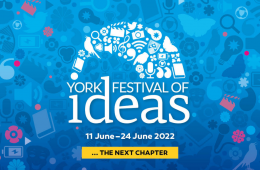York Festival of Ideas 11th to 24th June Book your tickets now
York Festival of Ideas
The Next Chapter
11-24 June 2022
York Festival of Ideas 2022 has a wide range of fascinating events to attend and engage with, both in person and online. A sample of the science events in this year’s programme is outlined below.
The full Festival programme can be explored at 2022 Festival of Ideas website
Some suggestions for you:
The Mind Reader vs The Machine, Saturday 11 June, 10am to 11am (in person)
Come along for a unique experience mixing magic, mentalism and fMRI research, and discover how University of York scientists are writing the next chapter of fMRI-based research.
Dinosaurs: New visions of a lost world, Saturday 11 June, 2pm to 3pm (in person)
World-leading palaeontologist Michael J. Benton offers a new visual guide to dinosaurs, showing how technological advances and new fossil finds have forever changed the way we see these extinct beasts.
Slime: A natural history, Monday 13 June, 1pm to 2pm (online)
Susanne Wedlich leads us on a scientific journey through the 3-billion-year history of slime, from its part in the evolution of life on Earth to how it might feature in the post-human future.
Wonderdog: How the science of dogs changed the science of life, Monday 13 June, 6pm to 7pm (online)
Deepen your understanding of our canine friends with zoology correspondent Jules Howard.
A Day in the Life of a Biomedical Scientist: Now and in the future, Tuesday 14 June, 5pm to 7pm (in person)
In this hands-on session, get acquainted with some key laboratory techniques currently used in hospital labs, and hear about new ways to diagnose and monitor diseases.
Medical Robotics, Wednesday 15 June, 7pm to 8pm (in person)
Zion Tse of the University of York discusses digital health in and beyond the COVID pandemic, and provides a glimpse into the future of healthcare. In partnership with the Yorkshire Philosophical Society.
Death by Shakespeare: Snakebites, stabbings and broken hearts, Thursday 16 June, 8pm to 9pm (online)
Chemist and author Kathryn Harkup turns her discerning scientific eye to the Bard and the varied and creative ways his characters die.
Racing Green: How motorsport science can save the world, Saturday 18 June, 2pm to 3pm (in person)
The cutting edge of our future – from electric cars to virtual reality – began on the motor racing track. Journalist and adventurer Kit Chapman explores the science that has been translated from racing to the road and explains how the motorsport of today could save the world of tomorrow.
Binding Blocks, Sunday 19 June, 11am to 4pm (in person)
Join the Binding Blocks team from the University of York’s Department of Physics to discover how nuclear physics has shaped the world around you and to see the elements like never before.
Beyond Measure: The hidden history of measurement, Sunday 19 June, 2pm to 3pm (in person)
Join journalist and writer James Vincent for a revelatory and vibrant (hi)story of measurement that will make you look at the world around you anew.
Plagues Upon the Earth: Disease and the course of human history, Tuesday 21 June, 8pm to 9pm (online)
Explore the history of humans and their germs with Kyle Harper, who weaves together a grand narrative of global history with insights from cutting-edge genetics.
Living Lab: Insights from the junction, Wednesday 22 June, 6pm to 7pm (in person)
Join York St John students and staff for an interactive panel event including short performances, citizen science activities and mini talks exploring air quality, health inequalities, and the kind of future they envision for York’s public spaces.
The Joy of Science, Thursday 23 June, 8pm to 9pm (online)
Acclaimed physicist Jim Al-Khalili reveals how eight lessons from the heart of science can help you get the most out of life.
Plotting Murder: An expert’s guide, Friday 24 June, 7pm to 8pm (in person)
Join award-winning crime writer Ann Cleeves and forensic soil science expert Professor Lorna Dawson to discover the connections between writing murder and evaluating soil data.

